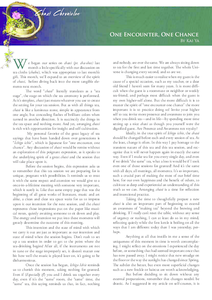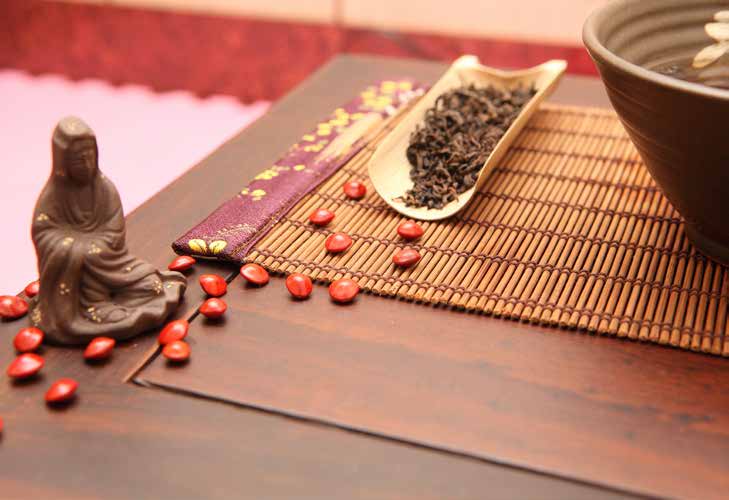
 |
|
We began our series on chaxi (pr. cha-shee) last month a little specifically with our discussion on tea cloths (chabu), which was appropriate to last month's gift. This month, we'll expand to an overview of the spirit of chaxi, before diving back into the more tangible elements next month.
The word "chaxi" literally translates as a "tea stage", the stage on which the tea ceremony is performed. At it's simplest, chaxi just means whatever you use to create the setting for your tea session. But as with all things tea, chaxi is like a luminous stone, simple in appearance from one angle, but concealing flashes of brilliant colors when turned in another direction. It is succinctly the things in the tea space and nothing more. And yet, arranging chaxi is rich with opportunities for insight and self-cultivation.
My personal favorite of the great legacy of tea sayings that have been handed down over generations is "Ichigo ichie", which is Japanese for "one encounter, one chance". Any discussion of chaxi would be remiss without an exploration of this poignant expression, as it speaks to the underlying spirit of a great chaxi and the session that will take place upon it.
Before the session begins, this expression asks us to remember that this tea session we are preparing for is unique, pregnant with possibilities. It reminds us to treat it with the same respect and attention we would give to a once-in-a-lifetime meeting with someone very important, which it surely is. Like that same empty page that was the beginning of all great works of literature, music and art alike, a clean and clear tea space waits for us to impress upon it our intention for the next session, and the chaxi represents those impressions put on the paper like musical notes, quietly awaiting someone to sit down and play.
The energy and intention we put into these moments will greatly determine the outcome of this meeting. This intention and the state of mind with which we carry it out are just as important as our intention and state of mind when the session begins. Don't rush to set up a tea session in order to get to the point where the tea-drinking begins! After all, if the instruments are not in tune or the stage improperly set, it doesn't matter one bit how well the music is played later on, it's going to be disharmonious.
Once the session has begun, Ichigo Ichie reminds us to cherish this moment, taking nothing for granted. Even if (Especially if!) you and I drink tea together every day, even if it's the "same" room, the "same" time, the "same" tea, this saying reminds us that, in fact, nothing and nobody, are ever the same. We are always sitting down to tea for the first and last time together. The whole Universe is changing every second, and so are we.
This is much easier to realize when my guest is the cause of a special occasion, such as my teacher, or a dear old friend I haven't seen for many years. It is more difficult when the guest is a roommate or neighbor or weekly tea-friend, and perhaps most difficult when the guest is my own higher-self alone. But the more difficult it is to muster the spirit of "one encounter one chance" the more important it is to practice doing so! Invite your higher self to tea; invite more presence and awareness to join you when you drink tea - and in life - by spending more time setting up a nice chaxi as though you yourself were the dignified guest. Are Presence and Awareness not royalty?
Ideally, in the true spirit of Ichigo ichie, the chaxi should be changed before each and every session of tea. At the least, change it often. In this way I pay homage to the transient nature of this tea and this tea session, and recognize that it will never happen again in exactly the same way. Even if I make tea for you every single day, and even if we drink "the same" tea, what a loss it would be if I took even one of those sessions for granted! And it's the same with all days, all meetings, all moments. It's so important, such a crucial part of making the most of our brief time here, for our own happiness and the benefit of others, to cultivate as deep and experiential an understanding of this truth as we can. Arranging chaxi is a time for reflection and intentional practice.
Taking the time to thoughtfully prepare a new chaxi is also an important part of beginning to extend an awareness of "making tea" beyond the brewing and drinking. If I really can't reset the table, without any sense of urgency or rushing, I can at least do so in my mind, reflecting quietly while the first kettle is boiling on all the ways that I am different today than I was yesterday, perhaps.
Anything at all that instills in me a sense of the uniqueness of this moment in time is worth contemplating. I might reflect on the emotions I experienced the day before, or something that had seemed important once that has now passed away. I might notice that new smudge on the floor or the way the sunlight has changed since Spring. The subtler the better, but even more superficial changes such as a new freckle or haircut are worth acknowledging.
But before deciding to sit down without any external preparations, remember that changes needn't be drastic. As I suggested in my article on self-courses, it is a nice practice to change a small item here or there, or to progress from one theme to another one over a course of a few days through small changes. This minimalistic approach to changing chaxi is also nice (and perhaps necessary) if you don't have a big selection of cloths and other utensils or elements to choose from yet.

At the end of the day though, there is something refreshing and complete in emptying the table, cleaning it, and laying out something wholly different than before. The more you practice chaxi the more you will begin to feel the way the energy you created at first slowly drains away the longer it sits, until like a flower it wilts and withers, instilling lifelessness into the space. You will notice that after about three to four sessions on the same chaxi it grows stale. Make sure to pay attention to this and change and clean the space before this happens, or your tea will be stale and lifeless as well!
Beyond the tea space, my chaxi practice reminds me that each moment of my life is a unique gift, no matter the form, and encourages me to respect and cherish them all. Over the years, I have cultivated greater appreciation and respect for all the moments of my life through practicing my chaxi.
Many times I have heard Wu De asking guests here to suppose that they have 1000 opportunities remaining in their life to share deep, meaningful, connecting experiences with their loved ones. "Given the choice," he asks, "How many of those are you willing to give up in trade for something else?" I've never heard anyone say they'd give up even one of them, not for any reason. And yet I know I've done it often enough.
It's unconscious, it's thoughtless, and it's involuntary, yet there it is. And what I wouldn't give to take them all back! How well I know that each time was one time too many. Someone I loved was there, and I ignored them for something terribly unimportant: I was reading a book, working on a project, or just in a bad mood. I have shooshed and shooed, tuned out, argued and shouted. Tragically, it's those closest to us most affected by our unconscious lack of presence. As with our practice of Ichigo Ichie, the person we drink tea with every day is the one we most often take for granted, our self.
In my heart I know I would want my last words to be words of love and gratitude, accompanied by a hug, no matter who it is. It's when I think I know someone, or start feeling as though I've seen them a thousand times before, as though I've already drunk tea with them hundreds of times and it's "just another tea session" that I take them for granted. I forget that their presence in my life is a miracle far beyond all reckoning, and I forget that nothing could be more important than making this a part of my daily consciousness.
When I remember this, there is nothing anyone can say to upset me, and no silly emotional swing that I am willing to cling to at the cost of losing connection to that moment - I just drop it, whatever it is, meet their eyes and rejoice in our mutual presence. I've never seen this person before, in this place, in this way; I recognize their infinite ever-changing beauty, and then whatever happens and wherever we are, it's wonderful.
When I don't remember, then that's one of those moments I missed, one of those moments I said I wasn't willing to give up and I gave it up anyway. But these moments are good too; now I've got fuel and inspiration to practice, and bring the spirit of Ichigo ichie ever more into my consciousness and my life, so that I can lose fewer and fewer of those moments to that unconscious mind. It really works.
After several years of putting Ichigo ichie into practice through my chaxi, I have made huge strides towards appreciating the never-ending uniqueness of the moments and people in my life, and continue to improve. Of course, every moment of a tea session (and life) is an opportunity to practice this. But I have found that in setting up (or even simply contemplating) the chaxi for a given session, an opportunity to explicitly practice is created. Creating that space then automatically cultivates awareness and attention towards finding that truth in other moments throughout my day. Personally, I really need this time of intentional, explicit practice each day; otherwise I will miss many of those opportunities the day presents me with.

Nothing is guaranteed in this life. It's all a gift. We have no rights to it, we didn't earn it and we don't get to keep it as long as we want to. We don't even get to know when our lease is up. It has been granted us through some extraordinary fate, and everything can change in a flash. Somewhere in Japan not long ago, a man was sitting drinking tea quietly in his house, and a huge wave of water fell on his head. The floor my tea-table and I are sitting on might crumble beneath us in an instant. We just never know.
As we travel along this journey with Tea, many of you will have noticed that the tea is never the same, although it is sitting there in its jar on the shelf where we left it last. Even more obviously within each session, we will never drink that same sip of tea we drank the sip before. Tea is an expression of the inexpressible and ungraspable beauty of change in this way, teaching us to let go of our desires to keep and possess, our desires for whatever we love in life to remain the same forever, allowing the beauty to slip through our fingers (and our cups) freely, without attachments and find the greater beauty in that very transience. Like our daily guest, each sip is different.
As I said in the beginning, there is so much there beneath that tea mat, such rich wisdom available for our cultivation. But let's not get too caught up in thoughts and words and practices. Let's remember that at its best, chaxi is beautiful and stirring and wonderful, without any thoughts connected to it at all. Therefore, let the articles in this new section of our new magazine be a guide to creating chaxi of your own, ones which strike the bell of stillness at the center of being and ring a greater, wordless truth to you and your guests...
"The Philosophy of Tea is not mere aestheticism... for it expresses conjointly with ethics and religion our whole point of view about Man and Nature. It is hygiene, for it enforces cleanliness; it is economics, for it shows comfort in simplicity rather than in the complex and costly; it is moral geometry, inasmuch as it defines our sense of proportion to the universe."
